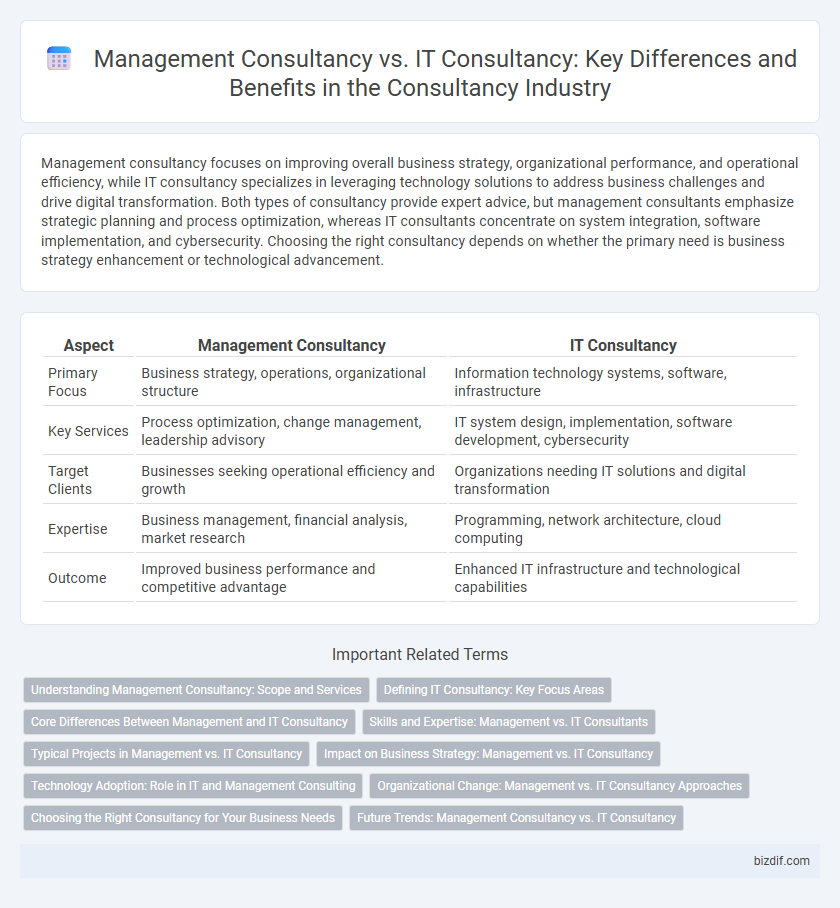Management consultancy focuses on improving overall business strategy, organizational performance, and operational efficiency, while IT consultancy specializes in leveraging technology solutions to address business challenges and drive digital transformation. Both types of consultancy provide expert advice, but management consultants emphasize strategic planning and process optimization, whereas IT consultants concentrate on system integration, software implementation, and cybersecurity. Choosing the right consultancy depends on whether the primary need is business strategy enhancement or technological advancement.
Table of Comparison
| Aspect | Management Consultancy | IT Consultancy |
|---|---|---|
| Primary Focus | Business strategy, operations, organizational structure | Information technology systems, software, infrastructure |
| Key Services | Process optimization, change management, leadership advisory | IT system design, implementation, software development, cybersecurity |
| Target Clients | Businesses seeking operational efficiency and growth | Organizations needing IT solutions and digital transformation |
| Expertise | Business management, financial analysis, market research | Programming, network architecture, cloud computing |
| Outcome | Improved business performance and competitive advantage | Enhanced IT infrastructure and technological capabilities |
Understanding Management Consultancy: Scope and Services
Management consultancy primarily focuses on enhancing organizational performance through strategic planning, operational improvement, and change management. Services include business strategy development, process optimization, leadership coaching, and organizational design tailored to diverse industries. Unlike IT consultancy, which centers on technology solutions and system implementations, management consultancy addresses broader business challenges and drives overall corporate growth.
Defining IT Consultancy: Key Focus Areas
IT consultancy specializes in optimizing technology infrastructure, software development, cybersecurity, and digital transformation strategies to enhance business operations. It involves assessing IT systems, recommending technology solutions, and implementing innovations that align with organizational goals. Core focus areas include cloud computing, data analytics, enterprise software integration, and IT governance frameworks.
Core Differences Between Management and IT Consultancy
Management consultancy primarily focuses on organizational strategy, business processes, and operational efficiency to drive overall company performance. IT consultancy emphasizes technology solutions, system integration, and digital transformation to enhance IT infrastructure and support business goals. Core differences lie in their scope: management consultants address high-level business challenges, while IT consultants specialize in technical expertise and technology implementation.
Skills and Expertise: Management vs. IT Consultants
Management consultants excel in strategic planning, organizational development, and operational efficiency, leveraging skills in leadership, business analysis, and change management. IT consultants specialize in technology solutions, software development, cybersecurity, and system integration, utilizing expertise in coding, network architecture, and cloud computing. Both roles require strong problem-solving abilities but differ in their focus on business processes versus technological infrastructure.
Typical Projects in Management vs. IT Consultancy
Management consultancy projects typically involve strategic planning, organizational restructuring, and performance improvement initiatives aimed at enhancing overall business efficiency. IT consultancy projects focus on technology implementations, systems integration, and cybersecurity enhancements designed to optimize IT infrastructure and support digital transformation. Both consultancy types require in-depth analysis and tailored solutions, but management consultancy emphasizes business processes while IT consultancy centers on technological advancements.
Impact on Business Strategy: Management vs. IT Consultancy
Management consultancy directly shapes business strategy by identifying organizational challenges and recommending solutions that enhance operational efficiency and market positioning. IT consultancy influences business strategy through technology integration, enabling digital transformation and driving innovation that supports long-term growth objectives. Both consultancies offer complementary insights, with management focusing on overall strategic direction and IT consultancy ensuring technological alignment to business goals.
Technology Adoption: Role in IT and Management Consulting
Management consultancy drives technology adoption by aligning IT solutions with strategic business goals, enhancing organizational efficiency and competitive advantage. IT consultancy specializes in the implementation and integration of advanced technologies such as cloud computing, cybersecurity, and data analytics to optimize operational performance. Both disciplines collaborate to ensure seamless technology adoption, bridging the gap between business strategy and technical execution.
Organizational Change: Management vs. IT Consultancy Approaches
Management consultancy drives organizational change by aligning business strategy, culture, and processes to enhance performance and adaptability. IT consultancy focuses on implementing technology solutions that enable digital transformation, optimize workflows, and support data-driven decision-making. Both approaches emphasize stakeholder engagement and change management, but management consultants prioritize strategic vision while IT consultants concentrate on technical infrastructure and system integration.
Choosing the Right Consultancy for Your Business Needs
Selecting the right consultancy depends on your core business challenges: management consultancy specializes in improving organizational strategy, operational efficiency, and leadership alignment, while IT consultancy focuses on technology solutions, infrastructure, and digital transformation. Businesses aiming to enhance corporate governance, change management, or market positioning benefit from management consultancy expertise, whereas those seeking system integration, cybersecurity, or cloud migration require IT consultancy services. Evaluating your business objectives and pain points ensures alignment with consultancy specialties, maximizing impact and return on investment.
Future Trends: Management Consultancy vs. IT Consultancy
Future trends in management consultancy emphasize strategic decision-making, organizational agility, and leadership development to navigate complex business environments. IT consultancy is rapidly evolving with advancements in artificial intelligence, cloud computing, and cybersecurity, driving digital transformation initiatives across industries. Both fields increasingly integrate data analytics and automation to enhance efficiency and deliver innovative, technology-driven solutions.
Management consultancy vs IT consultancy Infographic

 bizdif.com
bizdif.com